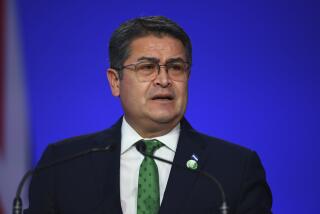Documents Show Link to Honduran Deal, Hamilton Says : Democrats Question Bush Contra Aid Denials
- Share via
WASHINGTON — Senior House Democrats were skeptical Sunday of President Bush’s insistence that aid to Honduras in 1985 by the Reagan Administration was not a quid pro quo for Honduran help to the Nicaraguan Contras.
“I’m not satisfied with his answers. I think we still need to know a lot more about . . . then-Vice President Bush’s activities,” said Rep. Lee H. Hamilton (D-Ind.), ranking majority member of the House Foreign Affairs Committee, who headed the House-select committee that investigated the Iran-Contra affair.
Hamilton said during an interview on NBC’s “Meet the Press” that Bush’s involvement had been shown by documents that surfaced at the trial of former White House aide Oliver L. North which indicated that former President Ronald Reagan had approved a plan for Bush to discuss a reciprocal deal with Roberto Suazo Cordova, then president of Honduras.
Denies Deal
After North’s conviction Thursday on three of 12 counts arising from the secret deal to finance illegal aid to the Contras with the proceeds of arms sales to Iran, Bush vehemently denied that he had discussed any quid pro quo during a meeting with Suazo in Honduras in February, 1985.
Maintaining that the documents “clearly reveal the involvement of the (then) vice president to a greater degree, I think, than he has acknowledged heretofore,” Hamilton said: “We should pursue that.”
Hamilton said he found it “very difficult for me to believe” that Bush was unaware of arrangements for the creation of a fund from profits of the Iran arms sale which the documentary evidence indicates was known to 17 other high officials.
“Those are very important documents. They were clearly within the scope of the investigation. They were not turned over to us; I don’t know why,” Hamilton said. There has been no authoritative explanation for the failure of the White House to include the papers among the thousands of documents it released to House and Senate investigators.
‘One Step at a Time’
Hamilton said he was “not seeking” to reactivate his old select committee, but conceded that there was “a possibility” that this might happen. He urged that the matter be considered “one step at a time.” The regular intelligence committees, he said, should first get the documents, then pursue their implications.
In a similar vein, Rep. David R. Obey (D-Wis.), chairman of the foreign operations subcommittee of the House Appropriations Committee, said he felt Congress had “an obligation to find out exactly what the facts are before we provide new money” for Honduras.
The North trial documents showed, he said, that $147 million in aid--triple the average of the preceding three years--had gone to that country in 1985. Obey said the basic question was whether that aid was extended in violation of the Boland Amendment, which then forbade use of any U.S. funds for direct or indirect aid to the Contras.
Obey said his committee is relying on Administration assurances of cooperation and is conducting no new investigation, but added that “we’ve got to have a better set of answers” than those received thus far.
Revival of Issue ‘Unfortunate’
Sen. Richard G. Lugar (R-Ind.), who appeared with Obey on CBS’ “Face the Nation,” called “resurrection” of the Honduran aid issue “very unfortunate.” He maintained that “it’s clear that throughout the entire period of the Reagan Administration we were giving a lot of assistance to Honduras . . . simply because they were very helpful in our foreign policy and what we were doing in Nicaragua.”
When the question of a possible presidential pardon for North was raised, Obey said he was opposed, but added that North ought not to be “left out there--we ought to know what everybody did.” Both Hamilton and Lugar said they considered it too early to deal with the question.
North, who is free on bond pending appeals, is scheduled to be sentenced June 23. He faces maximum penalties of 10 years in prison and fines of $750,000.
More to Read
Sign up for Essential California
The most important California stories and recommendations in your inbox every morning.
You may occasionally receive promotional content from the Los Angeles Times.













